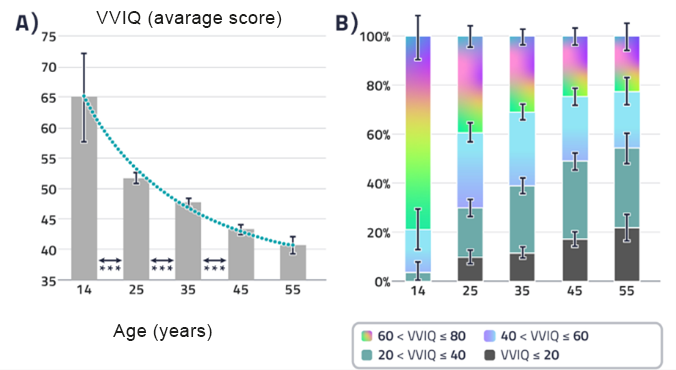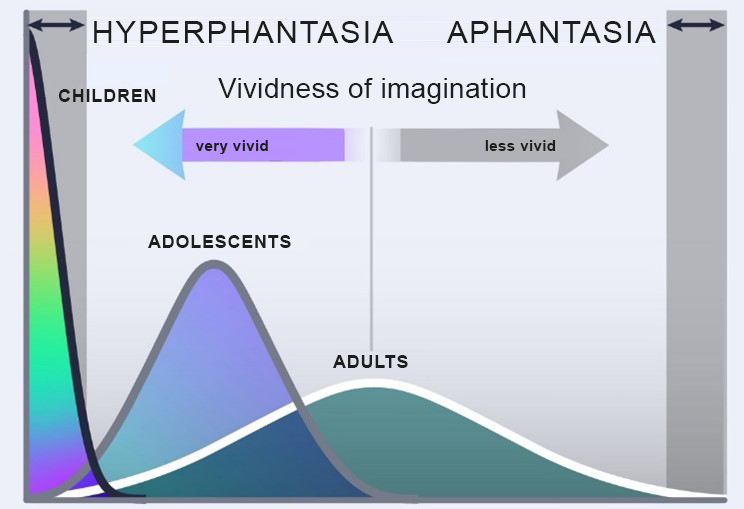Under the leadership of Dr Ilona Kovács, director of the ELKH-ELTE-PPKE Adolescent Development Research Group and a university lecturer at the Eötvös Loránd University Faculty of Education and Psychology (ELTE-PPKE ), in an online questionnaire-based study, researches have studied age-related changes in the functioning of the human imagination. They found that from age 12 to 60, the vividness of imagination declines consistently as people get older. The findings indicate that, in addition to the developmental aphantasia – a lack of imagination – that occurs in adulthood, there may also be a genetically based form of aphantasia that can also be observed in childhood. A study presenting the research has been published in the prestigious international journal Cortex.
Human imagination is perhaps the most subjective mental function, which is why it is difficult to compare the imagination of individuals. The vividness of imagination ranges from aphantasia, i.e. the complete absence of imagination, to hyperphantasia, i.e. a very vivid imagination.
Until now, investigations into the functioning of the imagination have primarily focused on capturing and measuring this subjective phenomenon in some way. Previous research using questionnaires, experiments and brain imaging methods have predominantly studied imagination activity in adults, which meant they did not reveal whether the vividness of imagination characteristic of an individual changes with advancing age, or what transformation imagination goes through during growth.
With the current study, the researchers were curious about the proportion of people living with aphantasia. In an online survey people of different ages were asked to fill out a simple questionnaire (Vividness of Visual Imagery Questionnaire, VVIQ). More than 2,000 respondents between the ages of 12 and 60 completed the questionnaire, which was compiled by the study’s primary author, Erzsébet Gulyás. When filling in the questionnaire the participants had to imagine some simple scenes before evaluating how vividly they were able to recall some details.
Since the sample was not representative it would be difficult to accurately determine the incidence rate of aphantasia based on the present study. However, the researchers observed a surprising and previously unknown negative trend in relation to aging. The study indicates that not only the number of people who have aphantasia, but also the number of people with hyperphantasia varies across different age groups. Based on the negative age trend shown in Figure 1. A), the older someone is, the lower their score is likely to be on the VVIQ questionnaire. Figure B) also shows what percentage of the entire age group people belong to different VVIQ score ranges. It is striking that while 80 percent of adolescents have very vivid imaginations, reporting an imagination of over 60 points on a 100-point scale, and none of them have a level of aphantasia below 20 points, while more than 20 percent of the oldest already belong to the aphantasia group, and just over 20 percent have hyperphantasia.

Figure 1
Based on the results, the researchers depicted the hypothetical development of the human imagination (Figure 2). While most children may fall within the hyperfantasy range, adults have lower imaginative vividness, and more and more people ‘slip’ into the aphantasia range as they age. In addition to developmental aphantasia occurring in adulthood, there may also be a genetically based form of aphantasia that can be observed even in childhood. The new findings have also been noted by the representatives of the world network of people living with aphantasia, and on September 30, 2022, a live online presentation and discussion will take place with the participation of people from all over the world who live with aphantasia.

Figure 2
The survey is still available, you can fill in the VVIQ questionnaire here, and find more information about the research here.